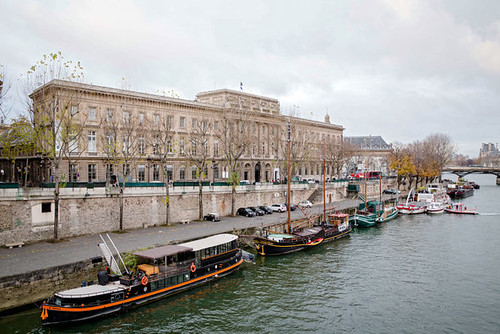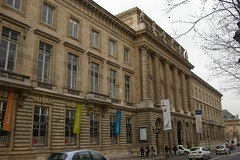
PREV ARTICLE
NEXT ARTICLE
FULL ISSUE
PREV FULL ISSUE
MONNAIE DE PARIS ADDS A DINING DESTINATIONIra Rezak forward this article about a new restaurant and plans for further renovations at the French Mint. Thanks! -Editor
 The three-Michelin-starred chef Guy Savoy is impatient. A 4,300-square-foot space at the top of the Monnaie de Paris — one of the city’s most beautiful buildings — is scheduled to open this spring as the reincarnation of his flagship restaurant on the other side of town. But the kitchen has no refrigerators and only partial electrical and heating systems. Buckets of water and cans of paint line the floors. Some of the light fixtures have not been installed. Paintings have not been hung. During a recent visit, Savoy roared through the empty spaces with the same air of authority that marks his reign over his kitchens. Frustrated that the windows in the main dining room were still being stripped of paint, he ripped off the protective paper covering one of them and threw it wide open to reveal the reason he decided to move his restaurant here. Before him was a front-and-center view of the Seine with the Louvre on the other side of the river, the Pont Neuf to the right, the Pont des Arts to the left and the Square du Vert-Galant, a pointy spit of land at the tip of the Île de la Cité, straight ahead. The booksellers on the riverbank below seemed almost close enough to touch. “Ah, look at this! It’s Paris at your feet!” he said. “There are many beautiful views on the world, but none, none like this one! The first time I saw it, it was like an electric shock. I said, ‘I have to be here.'”  The Monnaie de Paris — the French Mint — is unlike any other hallowed institution in Paris, and the installation of one of France’s marquee chefs here is part of its ongoing transformation. Founded in 864 by Charles the Bald, the grandson of Charlemagne, it is both the oldest institution in France and the oldest factory in Paris. The current building was redesigned and rebuilt in the 18th century and sits on a vast three-acre site on the Quai de Conti. Artisans have turned out coins, medals and decorations in the ateliers here since 1775. Once, all of the coins of the realm were produced here; though France’s official currency coins have been struck in the Monnaie de Paris’s factory at Pessac near Bordeaux since 1973, commemorative coins, jewelry, artwork and honorary medals like those of the Legion of Honor are still made here in Paris.
Eventually, there will be exhibits culled from the Monnaie’s permanent collection of 200,000 objects. The 17th-century Mansart townhouse on the site, which has been restored, will be open to the public next year. Savoy will open a brasserie called MetaLcafé in an interior courtyard. When there is enough money, the 22,000-square-foot garden will be replanted and pedestrian streets created. Luxury shops featuring French-made goods and a concept store will be installed in the courtyards and on the new pedestrian streets for both casual visitors and serious collectors. “Historically, the Monnaie de Paris has been closed in on itself, sort of like Fort Knox in the United States,” said Christophe Beaux, its president. “But it is the only active factory still operating within the city limits of Paris. We have 150 artisans and metalworkers here. Our goal is to open this beautiful beast to the world.” Currently, only 10 percent of the Monnaie site is open to the public; historically, only 20,000 people have visited every year (the numbers went up with the McCarthy exhibit to 1,000 visitors per day during the McCarthy exhibit). Beaux wants to increase annual visits to 500,000 — and for all this to happen by 2016. But work on the project has been slow. The opening of the restaurant Guy Savoy, for example, is already three years behind schedule, the result of French bureaucratic wrangling, environmental and aesthetic concerns and the discovery of massive quantities of lead in the paint and the pipes. To read the complete article, see:
I passed the article along to our traveling correspondent, Numismatourist Howard Berlin. His reply is below, along with a couple
pictures he'd taken on his visit to the Monnaie de Paris. -Editor
Howard writes:
I was invited at a past ANA show by a female employee at the Mint to visit the Mint when I am in London. She personally escorted me around the former museum and the workshops where the decorations/medals are made. For this trip, I experienced for the first time a round trip ride on the Eurostar train between London and Paris. It was a nice museum, and it is a shame what is the current transformation. However, it experienced the fate of lack of financial support from the government, just as did the Geldmuseum in Utrecht which was also forced to close. BTW, you can see a brief shot of the Monnaie de Paris from the nearby Pont Neuf (New Bridge) in one scene in the Bourne Identity (2002) film.  I'm not so sure this transformation is a bad thing; by giving up some space the mint will gain huge exposure and many more
potential visitors. The view sounds marvelous. Time will tell. Who will be the first E-Sylum reader to dine there? -Editor
Wayne Homren, Editor The Numismatic Bibliomania Society is a non-profit organization promoting numismatic literature. See our web site at coinbooks.org. To submit items for publication in The E-Sylum, write to the Editor at this address: whomren@gmail.com To subscribe go to: https://my.binhost.com/lists/listinfo/esylum All Rights Reserved. NBS Home Page Contact the NBS webmaster 
|

